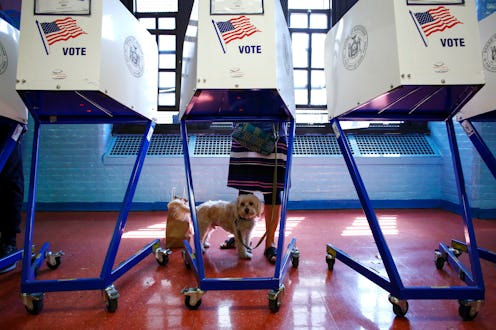News
The Primary Winners May Be Unclear Even In June
The results are in and the delegates have all been allocated. Five states voted Tuesday, and — while important — the Acela primary did not definitively decide the future of either party's primary race. Donald Trump and Hillary Clinton may be a bit closer to the nomination, but are they close enough? The delegate math continues to be the only way to get a better insight into each candidates chances, which begs the question: How many delegates are left after the Acela primary?
To answer the question, we need to break things down by party. The Democrats and Republicans assign different numbers of delegates to each state because they use their own criteria. So in the Republican race there are 502 delegates left, just over 20 percent of the total. The Democrats have 1016 delegates remaining, about 25 percent of the total pledged delegates for the party (that does not include superdelegates, who can vote for whomever they want). That's a decent amount up for grabs as the primary campaigns enter the last two months of voting.
So is that enough for Clinton or Trump to clinch their respective nominations before convention time? Yes, but it does not leave a lot of wiggle room, especially for Trump. These next states vary quite a bit in the Republican race. Trump may do well in Nebraska and West Virginia, but the race in Indiana is increasingly competitive, especially after John Kasich agreed not to campaign or advertise there. It will also potentially be harder for Trump to win in places like New Mexico and Oregon.
As for the Democrats, the proportional allocation of delegates makes things easier to predict. Throughout the entire election, Clinton has been ahead of her delegate targets, the number she needs from each state to secure the pledged delegate majority. She has room to work with, and she continues to poll well. New Jersey, California, and New Mexico all have significant minority populations too.
The races could shockingly be decided on June 7, the last day of voting in the Republican primaries. Only D.C. votes later for the Dems. California and New Jersey will both be voting, two of the most important states, delegate-wise for both parties. Montana, New Mexico and South Dakota also vote that day, plus North Dakota in the Democrat race.
Then, of course, there's always the chance that this won't be decided until the July conventions. Sanders' campaign manager pledged to fight for superdelegates even if he loses pledged delegate. Kasich and Ted Cruz's only hope is a brokered convention.
I know 20 and 25 percent of the total delegates doesn't seem like a lot, but it's going to be a long haul before we know who the nominees are. Pack snacks.
